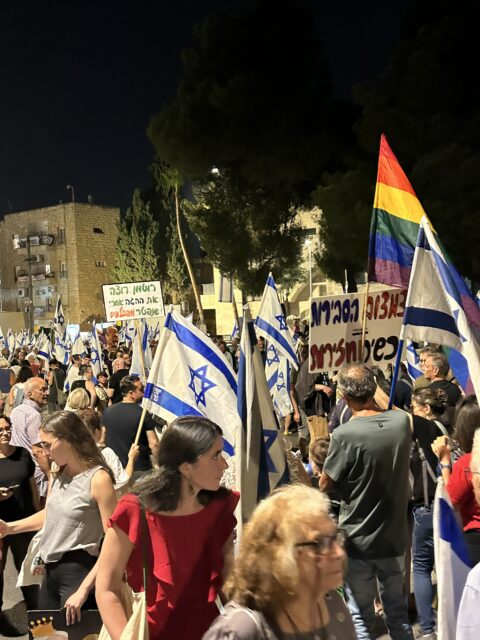As the Doobie Brothers sang: Israelis are “taking it to the streets.”
It has been every Saturday evening, as soon as Shabbat has ended — in every major city. And not just Saturday evening. It happens at all times — for the past 27 weeks.
As I write these words in Jerusalem, it is happening today. Today, all over Israel, is a “Day of Resistance.”
The chant has become an ear worm: “Demokratiyah!”, accompanied by drum beats.
But, what does that mean? Democracy is not only a process; not only an electoral mathematics; not merely a winner take all system.
Democracy is not only an adverb; it is an adjective that describes essential values — of why the State of Israel exists.
Israelis are protesting the proposed judicial reforms, and the corruption of this government, and the presence of racists in the government, and the growing toxicity of both a politicized hareidi Judaism and ultra-nationalism. And, yes: in Jerusalem and Haifa, in particular, some are protesting the ongoing occupation of the Palestinians — because that, too, is an existential threat to Israeli democracy.
I noticed something on this trip to Israel. I never meet Israelis who are bored. Boredom is not an Israeli thing. Israel happens to be in the fourth place among the “happiest” countries.
Yes, Israelis are happy.
And, they are also angry, and they are frightened, and they are frustrated.
I was in a coffee shop, and I paid with my Apple card. The young woman who worked there admired the card, and asked: “Can you get this in Israel?” The manager chimed in: “No, you can’t.” I teased her, in Hebrew: “One more reason to move to America?”
To which the manager responded: “We don’t need more reasons to want to leave here!”
As I finished my caffe hafuch (a.k.a. latte), I pressed him further on that. He is worried that the liberal country that he loves can sustain its vision, and whether it will continue to sustain him and his dreams.
Fears? At the rally that I attended this past Saturday evening, I saw many demonstrators with protest signs: “Without democracy, there is no academia.” That is the pushback of the educated class. Economic forecasters have said that if Israel gets to a point where it can no longer garner the support of investors and supporters, its financial situation will sink. Remember that whole “start up nation” thing? You can say “shalom” to that.
And yet, the political and social situation in this country has not diminished my love — even, my boyish romance — with the Jewish State.
Rather, the rallies feed that love.
Let’s talk about what it means to love a nation.
Those of us who came of age, politically, in the late 1960s recall how we marched against the war in Viet Nam.
We did not carry American flags.
Quite the contrary.
Some of us burned them; others, like the late Abbie Hoffman, wore them as shirts.
Not in Israel. In the streets of Tel Aviv, and Jerusalem, and Haifa, the protestors carry, wave, and drape themselves in Israeli flags, as pious Jews would wrap themselves in a tallit.
This is a movement of people who distrust the government, and who love the country.
So, let us be clear. The protestors are not only fighting for a democratic Israel. They are fighting for a successful Israel — and without that success, the Jewish State will not survive.
It really is that real, and that raw.
As journalist Matti Friedman put it on Saturday evening:
Everyone who knows Lebanon knows where this can lead. But there is a difference between us and Lebanon, and the difference is us. We, all the citizens, all the ethnic groups, all the streams that believe in the joint good…. all of us born into a national movement that created miracles and that taught us that reality is strong but that our will is stronger…Lebanon is a possibility. But we will not let it happen We see a different future and that is the future that will be.
When people ask me why I love Israel as much as I do, here is why.
The other day, I developed a heat rash. I went to a dermatologist. When he asked me what was wrong, I told him, in Hebrew: “I seem to be a metzora.”
Metzora is the term in the Torah for someone who has a particular skin disease — usually mistranslated as leprosy.
He had all the bearings and markings of a secular Israeli.
Nevertheless, he laughed.
He got it, because this is his literature, and our literature, and it is a point of reference that shapes us.
That’s Israel. That is why I love it here, and it is why I am addicted to this beautiful, maddening place.
That is why I have gone into the streets as well — to show my emotional, spiritual, and national commitment to Israel as a Jewish, democratic, and secure state.
It is also why, at the protests, I do something a little off script for me.
I put on a kippah.
Normally, I only wear a kippah when I teach, learn, and pray, and enter the home of observant Jews (also, in the United States, when I go to a kosher restaurant).
So, why at a protest rally?
Abraham Joshua Heschel put it, famously, when he marched at Selma: “My feet were praying.”
I did not march at Selma. But, I have marched in front of the official presidential residence in Jerusalem.
And yes, my feet were praying, as well — that this great enterprise called the Jewish State — the greatest achievement of the Jewish people in the last two thousand years — will succeed.
So, what’s at stake at these rallies?
Only Jewish history.
It really is that simple, and it really is that compelling.






